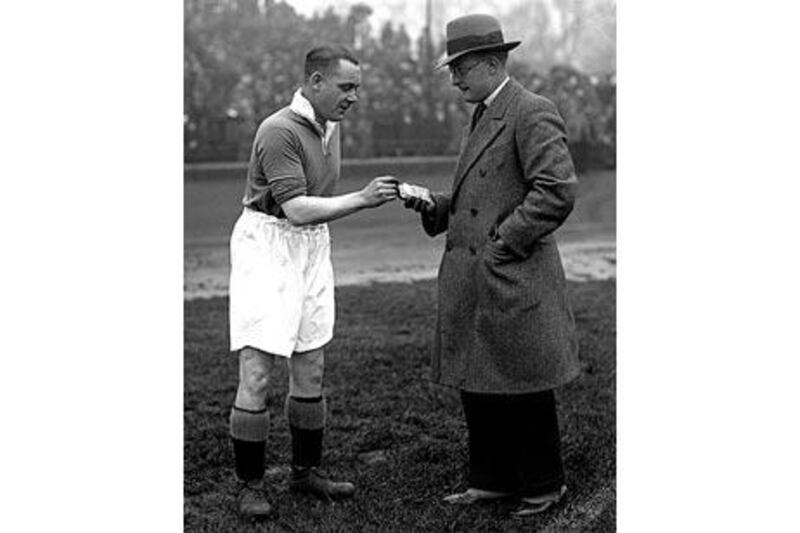Revelatory, scything, uproarious yet alarming, the film Super Size Me was nominated for an academy award in 2005 after graphically depicting the adverse effects that regular consumption of junk food has on the body. Morgan Spurlock, the documentary's New York director, binged daily on McDonald's fast food, breakfast, lunch and dinner, over a frightful month.
Spurlock added a caveat that indicated his willingness to upsize, or Super Size, whenever possible. A side effect of such gluttony, apart from the mandatory teeming waistline, was depression. It is a condition that seems to have shrouded the UAE's frail football team since their scruffy World Cup qualifying campaign began badly with a 2-1 loss to North Korea last September, and waddled downhill to conclude with one point from their eight games.
When one digests the remarkable comments of Saleh Obaid, a player with the Abu Dhabi side Al Jazira, in today's news pages of this organ, these are a series of games that should perhaps be retitled as Super Size UAE. Junk food seems to have had an adverse affect on their system, however muddled it has been. Obaid tells of men, internationalists of the modern era, readying themselves for games by gorging on McDonald's meals. Burgers and fries all round while the UAE's World Cup goose was being cooked by fitter, more mobile units.
Such a grotesque display of amateurism in times of supposed professionalism. Such startling comments by a player, such wayward values for his team that reflects badly on the former coach Bruno Metsu, and the outgoing Dominique Bathenay. Obaid's outpouring should give everyone food for thought who invests in the health of the UAE's national sport. Poor diet is an issue that has a profound effect on the western world, force-fed by the USA's fast food culture. The UAE has hardly escaped this pestilence. Obesity is a visible sight if one looks around the busy and, in parts, flabby cities of Abu Dhabi and Dubai.
According to the latest figures from the World Health Organisation, 39.9 per cent of women in the UAE are obese, the seventh highest proportion in the world, and of the country's men, 25.6 per cent were classified as obese, the ninth highest figure. But it is alarming to hear of supposed athletes, national linchpins, fraternising with fast food, especially when faced with a World Cup qualifying group that contained South Korea, North Korea, Iran and Saudi Arabia.
Unprofessionalism, poor diet and the ill-habits of smoking and boozing were once rife in the working-class home of football, the sociable hotbeds of England, Scotland, Ireland and Wales, but was especially widespread more than 60 years ago when men such as Nat Lofthouse, the Bolton and England striker, liked to relax after kicking a ball by kicking back with a cigarette. "There's nothing better than a good smoke," Lofthouse once muttered. The Newcastle striker, Jackie Milburn, nipped into a toilet at the old Wembley before the 1951 FA Cup final and discovered four of his teammates having a quick drag to relax the nerves.
Pre-match meals were once so mountainous that it is a wonder players never nodded off during matches. The Tottenham striker, Jimmy Greaves, recalls in his autobiography Greavsie "our pre-match meal of roast beef and Yorkshire with all the trimmings, or pie and mash followed by blackcurrant crumble and custard". Footballers are usually not perceptive enough to eat humble pie, but there are those who have attributed elongated careers to proper eating habits. Gordon Strachan, the former Leeds and Scotland midfielder, was hardly feckless in playing on in the English Premier League until he was 40. He said a penchant for porridge and bananas was a telling influence on his longevity.
Arsenal's French manager, Arsene Wenger, was horrified when he studied the staple diet of English football players. Wenger has never been a bloated individual. He has an appetite for the Japanese diet of vegetables, fish and rice. He feels English people are too fond of sugar and meat, and not enough greens. Paul Gascoigne railed against the system, accusing dieticians of robbing the sport of distinctive characters.
Obaid's revelations come after the first season of a UAE professional league has been polished off. Mohammed Khalfan al Rumaithi, the president of the UAE Football Association, has already denounced the performance of the national side at the World Cup and their defence of the Gulf Cup in Oman, where they were emptied out in the first phase. Starved of any wins against weightier opponents, the UAE players can fall back on their comfort food. McDonald's, a leading sponsor of the Fifa World Cup, will be in South Africa next year. Obaid and his colleagues will not. The UAE may like to munch a burger even if, in a chastening World Cup qualifying experience, they have been done up like a kipper.
dkane@thenational.ae





